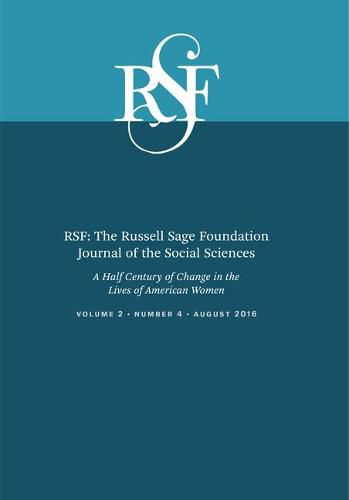Readings Newsletter
Become a Readings Member to make your shopping experience even easier.
Sign in or sign up for free!
You’re not far away from qualifying for FREE standard shipping within Australia
You’ve qualified for FREE standard shipping within Australia
The cart is loading…






Over the last fifty years, American women have made considerable social and economic gains. They now make up half of the workforce, enroll in college at higher rates than men, and hold a larger share of the most prestigious jobs and political offices than in the past. Yet, their collective progress has slowed or stalled in other ways, including an enduring gender wage gap and continued underrepresentation in STEM occupations and other fields. In this special issue of RSF, edited by Martha J. Bailey and Thomas A. DiPrete, a multidisciplinary group of social scientists explores half a century of women’s changing work and family roles and analyzes the implications of these shifts for gender equality. The contributors examine trends in women’s participation in the labor market, focusing on how working both shapes and is shaped by women’s roles within their families. Tanya Byker investigates the so-called opt-out revolution and finds that, surpringly, the rate of opting out has been constant for the last twenty years even as women’s labor-force participation and pay has increased. Ipshita Pal and Jane Waldfogel show that the motherhood penalty is shrinking and may even reversing for mothers who are married, white, or highly educated. And while marriages in which women out-earned their husbands were once more susceptible to divorce, Christine Schwartz and Pilar Gonalons-Pons show that this relationship has essentially disappeared, suggesting that the growing economic advantage of a high-earning wife has facilitated a revolution in traditional gender roles. Despite these gains, Kim Weeden and co-authors show that the growth of jobs requiring more than 50 hours of work per week, which are disproportionately filled by men, has played an increasing role in perpetuating the gender pay gap. Similarly, Katherine Michelmore and Sharon Sassler find that within STEM fields, a gender pay gap persists partly because women are still more likely to work in lower-paid occupations.
The rapid advancement of women in education and the workforce was a distinguishing feature of the twentieth century, even though barriers to opportunities for women still exist. . Together, the articles in this issue of RSF provide insightful context for these achievements and describe women’s evolving status in society.
$9.00 standard shipping within Australia
FREE standard shipping within Australia for orders over $100.00
Express & International shipping calculated at checkout
Over the last fifty years, American women have made considerable social and economic gains. They now make up half of the workforce, enroll in college at higher rates than men, and hold a larger share of the most prestigious jobs and political offices than in the past. Yet, their collective progress has slowed or stalled in other ways, including an enduring gender wage gap and continued underrepresentation in STEM occupations and other fields. In this special issue of RSF, edited by Martha J. Bailey and Thomas A. DiPrete, a multidisciplinary group of social scientists explores half a century of women’s changing work and family roles and analyzes the implications of these shifts for gender equality. The contributors examine trends in women’s participation in the labor market, focusing on how working both shapes and is shaped by women’s roles within their families. Tanya Byker investigates the so-called opt-out revolution and finds that, surpringly, the rate of opting out has been constant for the last twenty years even as women’s labor-force participation and pay has increased. Ipshita Pal and Jane Waldfogel show that the motherhood penalty is shrinking and may even reversing for mothers who are married, white, or highly educated. And while marriages in which women out-earned their husbands were once more susceptible to divorce, Christine Schwartz and Pilar Gonalons-Pons show that this relationship has essentially disappeared, suggesting that the growing economic advantage of a high-earning wife has facilitated a revolution in traditional gender roles. Despite these gains, Kim Weeden and co-authors show that the growth of jobs requiring more than 50 hours of work per week, which are disproportionately filled by men, has played an increasing role in perpetuating the gender pay gap. Similarly, Katherine Michelmore and Sharon Sassler find that within STEM fields, a gender pay gap persists partly because women are still more likely to work in lower-paid occupations.
The rapid advancement of women in education and the workforce was a distinguishing feature of the twentieth century, even though barriers to opportunities for women still exist. . Together, the articles in this issue of RSF provide insightful context for these achievements and describe women’s evolving status in society.